
views
X
Trustworthy Source
PubMed Central
Journal archive from the U.S. National Institutes of Health
Go to source
If you’d like to try and improve your own health with turmeric, then there are plenty of ways to incorporate it into your diet. However, don’t consider the spice as a replacement for professional medical treatment. If you have any health conditions, then visit your doctor for the recommended treatment. Then you can see if eating more turmeric improves your condition.
How to Add Turmeric to Your Diet
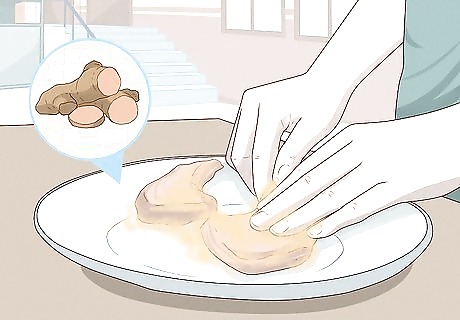
Coat chicken or fish with turmeric powder. Turmeric pairs especially well with these meats. Try rubbing the meat with turmeric before you cook it so the spices soak in during the cooking process. You could also mix turmeric with other spices like cumin, chili powder, pepper, cayenne, and garlic powder for a varied spice rub. Turmeric doesn’t go as well with red meats because the flavors clash. You should reduce your red meat intake overall anyway, because it contains a lot of saturated fat and could raise your blood pressure.
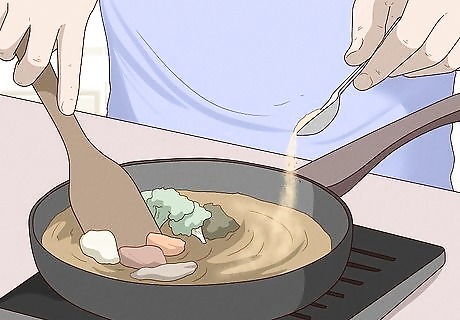
Sprinkle turmeric over vegetables or rice. Whether the vegetables are just a side dish or the main meal, turmeric can give them a great flavor that complements the protein you use. You can either sprinkle the spices in when the vegetables or done cooking, or coat them before you cook for added flavor. Roasting or sautéing vegetables with turmeric helps the spices soak in for more flavor.

Add turmeric to coffee, smoothies, soups, and other liquids. If you want to be a little more adventurous, you can add turmeric to some of your favorite drinks. Stir a teaspoon into coffee or a smoothie for extra flavor. It also gives soups and broths an extra spice. Turmeric doesn’t dissolve well in water, so expect some residue in any drink you use it in. Coconut oil pairs well with turmeric and can add a unique, nutty flavor to your smoothies. Try adding a scoop to your smoothies for some added flavor.

Make turmeric tea for a tasty herbal drink. Herbal tea is another popular way to consume turmeric. Scoop a teaspoon into an empty mug and then pour boiling water over it. Stir thoroughly and enjoy your herbal tea. Turmeric tea can taste a bit strong plain, so adding a bit of honey and lemon will improve the flavor. These ingredients are therapeutic in their own right as well. Turmeric tea can stain your teeth yellow, so you might want to rinse your mouth with water after you’re done with your tea.

Take curcumin supplements for a direct dose. Curcumin is a compound in turmeric, and it’s responsible for most of the spice’s health benefits. There are curcumin dietary supplements that can also provide health benefits, so you could try taking these instead of mixing turmeric into your food. Curcumin supplements often direct you to take 500 mg per day, but check the dosing instructions on the brand that you use. Always ask your doctor if curcumin supplements are safe for you before taking them.
Safe Ways to Take Turmeric

Start with 1 tsp (5 g) to make sure you aren’t sensitive to turmeric. Some people experience minor stomach pain or diarrhea when they eat turmeric. Start off small by adding just 1 tsp (5 g) to your meals. If you don’t experience any side effects, then feel free to add as much as you want. Starting small is also a good way to make sure you like the flavor of turmeric. If you add too much, you could ruin your meal’s taste.
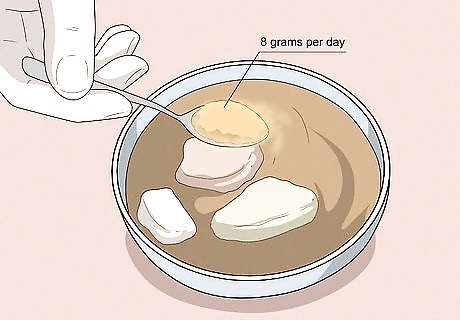
Limit your turmeric intake to 8 grams per day. Doctors are confident that consuming up to 8 grams per day is safe, but aren’t sure about higher doses. It’s best to cut yourself off at 8 grams to make sure you don’t experience any side effects.

See your doctor if you have any specific medical problems. While turmeric does have health benefits, it isn’t a replacement for professional medical treatment. If you are diagnosed with any medical problems, then speak with your doctor about your treatment options first. Follow their recommendations, and then try adding turmeric to your diet to help.

Ask your doctor if curcumin supplements are safe before you take them. As with all health supplements, curcumin could have some side effects or drug interactions. Ask your doctor if these supplements are safe for you before you start taking them. It's especially important to ask your doctor about curcumin if you take medication regularly. Curcumin could interact with blood-thinning medications like warfarin, Plavix, and aspirin. It could also reduce the effect of drugs that reduce stomach acids, as well as cholesterol medication.
Things Turmeric Could Help With
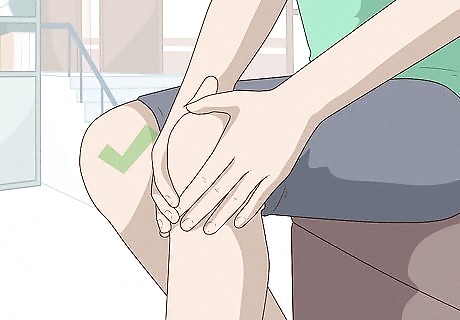
Reduce inflammation to relieve arthritis and other joint pain. Turmeric’s anti-inflammatory properties are what make it a traditional health treatment. Studies show that it can reduce joint inflammation and pain, making it a popular home remedy for arthritis and other joint problems. The particular study that showed the best results was for knee pain specifically, so especially try it out if arthritis affects your knees.

Improve your cardiovascular health. Some studies show that turmeric could lower blood pressure, cholesterol, and triglycerides. This is all good for your cardiovascular health and could reduce your risk for heart attacks in the future. Turmeric could help improve your cardiovascular health, but it’s still important to follow a healthy diet and exercise regularly.

Treat irritable bowel syndrome and other digestive issues. Diseases like irritable bowel syndrome and colitis come from inflammation in your GI tract. Turmeric could reduce this inflammation and help treat these bowel disorders. Since turmeric is a spice, it might also aggravate your symptoms. Start with a little bit at a time to see how it affects you first, then increase the dose if you tolerate it well.
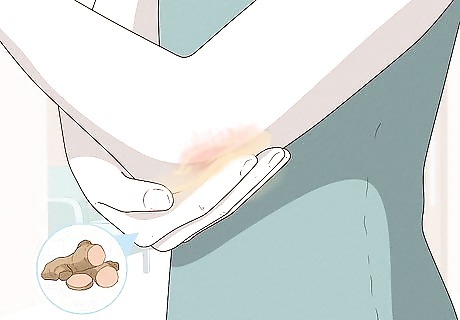
Accelerate wound healing and avoid infections. There’s some evidence that turmeric taken orally helps wounds heal faster. This could reduce inflammation, scarring, and the risk of infection from injuries or surgery. You can also apply turmeric to irritated skin to fight inflammation. Mix it with water to make a paste and rub it onto the affected area.















Comments
0 comment